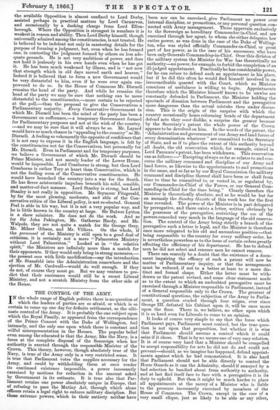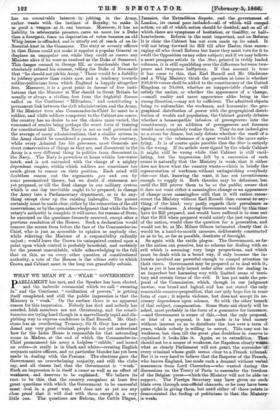THE CONTROL OF THE ARMY.
IN the whole range of English politics there is no question of .I. which the leaders of parties are so afraid, or which is so certain to come up one day for definite settlement, as the ulti- mate control of the Army. It is probably the one subject upon which the Royal Family, as appeared from the correspondence of the Prince Consort with the Duke of Wellington, feel intensely, and the only one upon which there is constant and wilful misrepresentation in the Houses. The popular belief even among the educated is that the Army, like the Navy, is a force at the complete disposal of the Sovereign when her authority is exerted through the responsible Minister of the Crown. This theory, however, though absolutely true of the Navy, is true of the Army only in a very restricted sense. It is true that Parliament votes the supplies necessary for the Army, and could by withholding them at once render its continued existence impossible, a power incessantly exercised by motions for reduction in the amount asked by Government in its estimate. It is true also that Par- liament retains one power absolutely unique in Europe, that of refusing to pass the Mutiny Act, through which alone officers retain a legal right to enforce military discipline. But these extreme powers, which in their entirety neither have been nor can be exercised, give Parliament no power over internal discipline, or promotions, or any personal question con- nected with Army management. Those appertain exclusively to the Sovereign as hereditary Commander-in-Chief, and are exercised through her agent, to whom she either delegates her entire power, as was done in the case of the Duke of Welling- ton, who was styled officially Commander-in-Chief, or great part of her power, as in the case of his successors, who have been only Generals Commanding-in-Chief. Over this division of the military system the Minister for War has theoretically no authority—no power, for example, to forbid the completion of an ill-judged appointment. Practicallyhe has considerable power, for he can refuse to defend such an appointment in his place, but if he did this often he would find himself involved in an irreconcileable quarrel with the Court, which no Minister conscious of usefulness is willing to begin. Appointments therefore which the Minister himself knows to be unwise are constantly defended in Parliament, the Minister holding the spectacle of disunion between Parliament and the prerogative more dangerous than the actual mistake then under discus- sion. This is the origin of the surprise with which the country occasionally hears reforming heads of the department defend acts they must dislike, a surprise the greater because by the Secretary's patent the whole power of the Crown appears to be devolved on him. In the words of the patent, the "Administration and government of our Army and land forces of every denomination whatever" are committed to the Secretary of State, and as if to place the extent of this authority beyond all doubt, the old reservation which, for example, existed in Lord Panmure's patent, has been withdrawn. This reservation ran as follows:—" Excepting always so far as relates to and con- cerns the military command and discipline of our Army and land forces, as likewise to the appointments to and promotions in the same, and so far as by our Royal Commission the military command and discipline thereof shall have been or shall from time to time be committed to, or vested in, or regulated by, our Commander-in-Chief of the Forces, or our General Com- manding-in-Chief for the time being." Clearly therefore the Minister is theoretically absolute, and so he would be but for an anomaly the Sunday Gazette of this week has for the first time revealed. The power of the Minister is in part delegated by prerogative, and there exists a letter, written obviously by the possessor of the prerogative, restricting the use of the powers conceded very much in the language of the old reserva- tion. The control of the Army being strictly a branch of the prerogative such a letter is legal, and the Minister is therefore once more relegated to his old and anomalous position—that being responsible to the country for every military order, he is nevertheless powerless as to the issue of certain orders greatly• affecting the efficiency of his department. He has to defend men he did not select and censure men he cannot remove.
There can scarcely be a doubt that the existence of a docu- ment impairing the efficacy of such a patent will now be matter of Parliamentary inquiry, or that the arrangement must be reduced, if not to a better at least to a more dis- tinct and formal shape. Either the letter must be with- drawn or the patent revised, and some clear statement made as to the extent to which an undoubted prerogative must be exercised through a Minister responsible to Parliament, instead of a General responsible only to the Crown. The greatest of constitutional questions, the subjection of the Army to Parlia- ment, a question evaded through four reigns, ever since George III. defeated his Cabinet upon it, will be once more upon the floor. There is, we believe, no other upon which it is so hard even for Liberals to come to an opinion.
It looks of course very simple to say that the force which Parliament pays, Parliament must control, but the brae ques- tion is not upon that proposition, but whether it is wise that Parliament should assume a control which it could seize if it chose. That is by no means one of very easy solution. It is of course very hard that a Minister should be compelled to accept responsibility for acts he did not do and could not prevent—should, as we imagine has happened, defend appoint- ments against which he had remonstrated. It is also hard that Parliament should not be able directly to control the Horse Guards as it can the Admiralty, should if annoyed by a bad selection be bandied about from authority to authority, and at last find itself face to face with a prerogative it is its duty to uphold. But then it might be much harder to place all appointments at the mercy of a Minister who is liable to the pressure incessantly exercised by members of the House of Commons. The Crown, except in the case of a very small clique, just as likely to be able as any other, has no. conceivable interest- in jobbing in the Army, rather- wants- with the instinct; of Royalty, to make, it as good -a. weapon- as it can become. Moreover, it has no liability: to asistocratio presstire, cares no , more for a Duke than .abounvois, fears no deprivation of vote* because aa old Whig.house is offended, and is utterly-out-of, reach of an in- finential knot in tlae Coramons. The sixty or seventy officers in-that House could not make it appoint a popular General or displace an unpopular one, while they could so coerce any Minister alive if he were as-resolved as the Duke. of Somerset. This danger. seemed to George ILL so considerable that he absolutely refesed his consent, telling the Duke of Newcastle that "he shouldnot job his Army." There would be a liability to jobberrgreater than exists now, and a tendency towards soldieiepoliticians from which England is happily altogether free. Moreover, it is a great point in favour- of free insti- tutions that the Minister at War should in Great. Britain be usually, or always a. civilian, free from the frightful disease called on the Continent "Militarism," and constituting a permanent :Erik. between the civil adrainistration and the Army. If the Minister were also. Commander-in-Chief he must be a soldier, and while soldiers competent to the Cabinet are scarce, the country has no desire to see the. choice more varied, the conamand- of armies being-perhaps the worst form of training for constitutional life. The Navy is not so well governed on the average of many administrations, that a similar system in- the Army, should be considered a panacea. On the contrary, while. every- Admiral- has his grievance, most Generals are stout conservatives of things as they are, and discontent in the Army is a very different thing in politics from discontent in the Navy. The Navy is powerless at home within low-water- mark,.- and is not entrusted with the charge of a mighty. dependent empire, within which soldiers are sometimes too- much- given, to reason on their position. Each mind will doubtless reason out the arguments pro. and coa by some preconceived theory, but we doubt if statesmen are yet prepared, or till the final change in our military system which is one: day inevitable ought to be prepared, to change the- Army into a Parliamentary department, or to do- any- thing. except clear up the existing. imbroglio. The- patent certainly must be made clear, either by the reinsertion of the old reservations, or bythe open acknowledgment that while the Sec- retary's authority is complete it will never, for reasons of State, be exercised on the questions formerly reserved, except after a previous resolution of the Houses. Such •a declaration would remove the screen from before the. face of the Commander-ine Chief, who ;is. just as accessible to opinion as anybody else, while relieving; the- Minister of a. responsibility radically unjust; would leave the Crown its unimpaired control upon a point upon which--control is probably beneficial, and certainly for the present unavoidable, while acknowledging to the full that on this, as on every, other qeestion of constitutional authority,. a--vote of the Houses is the tatima ratio to which Crown-.and -Cabinet must in the long run -gracefully submit.































 Previous page
Previous page